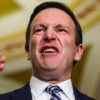The public doesn’t trust Washington politicians—and those politicians don’t trust each other. Those two truths could doom President Obama’s health care bill even if it weren’t an unaffordable behemoth.
The final health debate merges multiple story lines into one, just as March Madness does for an assortment of college basketball teams. Some of these themes are:
The Daily Signal depends on the support of readers like you. Donate now
–The Ugliness of Today’s Washington. Trust in elected leaders is collapsing into a hole deeper than Alice ever fell into. It deepens with every disclosure of the process. “Deeming” a bill to pass; avoiding votes to avoid accountability; buying votes with taxpayers’ money, etc. “Louisiana Purchase” and “Cornhusker Kickback” are only visible symptoms of a wayward system that long ago went amok.
–House vs. Senate Mistrust. Even if the House passed it this weekend, that bill must go back through the Senate. Knowing it could be blocked or changed in that chamber, House members are reluctant to take political risks with no reward. Thanks to the reconciliation process is being used, GOP Senators think they can win parliamentary rulings that automatically strike out multiple parts of the bill. The Senate Budget Chairman predicts the bill definitely would be changed in the Senate. That would mean a return trip to the House and a repeat of this soap opera—again diverting attention from more pressing issues like fixing the economy.
–Making Health Care Cost More for Individuals. President Obama and Sen. Lamar Alexander (R, TN) publicly sparred over whether the bill would make individual coverage cost less or more than it does already. Eventually, Obama was forced to admit—live on C-SPAN last month—that many Americans indeed would pay 10% to 13% more. This week, an Associated Press fact check article found no truth in Obama’s oft-repeated claim that his proposal will make individuals’ health insurance more affordable.
–Making Health Care Cost More for Government. The trillion-dollar cost of the bill (over ten years) makes people wonder how spending more would supposedly reduce the deficit. The simple answer is that it creates and raises taxes by more than a trillion dollars, such as new taxes on health insurance and medical devices. As The Heritage Foundation concludes, there are “Six Ways the Senate Health Care Bill Raises Health Care Costs, Kills Jobs, and Weakens the Economy.” The Congressional Budget Office admits its fiscal evaluation is “preliminary,” and others call the numbers “phony.”
–Creating Doomsday. The chair of Blue Dog Democrats, Rep. Stephanie Herseth-Sandlin (D, SD), predicts the use of “deeming” via the Slaughter Rule, “would poison an already terribly partisan atmosphere and leave the Congress even less able to find bipartisan solutions to fiscal problems that are on the verge of becoming overwhelming.” Once more, we learn that no situation is so bad that government cannot make it worse.
–Ignoring the Real Problems. As Rep. Jason Altmire (D, PA) told ABC News, “The long-term cost projections are simply unsustainable.” He correctly noted that cost containment is missing. Even if 15% of Americans lack insurance and want it given to them at taxpayer expense, the other 85% who have health insurance want lower premiums. Offering them a government subsidy doesn’t reduce the costs—that money has to be taken from taxpayers before a part would be given back as a subsidy. Yet that is what Obama calls “savings” for consumers. Sleight-of-hand is too kind a term for that process.
–The “All About Me” Approach. Sadly, the White House is pitching the notion that aye votes are needed to save the Obama presidency rather than help the country. As Rep. Jose Serrano (D, NY) described after Obama met with the Congressional Hispanic Caucus, “He was subtle, but that was the underlying theme of the meeting — the importance of passing this for the health of the presidency.” If that means some Democrats in Congress are thrown under the bus and defeated at the polls, it’s an acceptable price to their leaders.
So when Obama calls for Congress to show “courage” by voting on the bill it’s easy for him to say. It’s others who will pay the price—both members of his party and the beleaguered taxpayers of the United States of America.
In basketball, March Madness will end on April 5th. But in politics, the madness promises to continue at least until November.
































